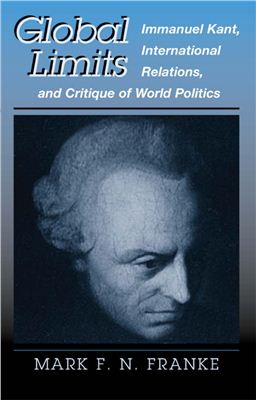State University of New York Press, Albany, 2001, 265 p.
The thought of the eighteenth century philosopher, Immanuel Kant, has been widely used and debated in inteational relations, especially in the past decade. Reflecting on this, Mark F. N. Franke ably demonstrates that Kant's thought does not cohere neatly with any of the disciplinary paradigms or concepts that have constituted the field. He also shows how many contemporary exponents of Kant's inteational thought - especially those who argue that democracy causes peace - ignore the critical philosophic foundations on which it is based.
Kant in Inteational Relations.
Politics of Theory Confronts the World.
Interests, Arguments, and Chapters.
The Rendering of Kant in Inteational Relations Theory.
Readings of Perpetual Peace.
Requirements of a ‘Kantian’ Paradox.
Masking Inteational Relations in Perpetual Peace.
The Need for Philosophical Reflection.
Kant and the (Im)Possibility of Inteational Relations Theory.
Kant’s Refusal of Traditional Debates.
Kant’s Challenge to Conventional Attitudes.
Conditions for the Possibility of Theorizing Inteational Relations.
Enlightenment and the Impossibility of Inteational Relations Theory.
Critique of World Politics.
Judgment and the World.
Kant’s Geopolitics.
Beauty and the Beast: Extending Leviathan to the World.
Beginnings of a Critical Approach Toward World Politics.
Chapter Four: From World Politics to Politics (in ‘the World’).
Enlightenment as a Limit Attitude.
A Limit Attitude for the Study of World Politics.
Imperatives of Responsibility.
Doubting World Politics.
The thought of the eighteenth century philosopher, Immanuel Kant, has been widely used and debated in inteational relations, especially in the past decade. Reflecting on this, Mark F. N. Franke ably demonstrates that Kant's thought does not cohere neatly with any of the disciplinary paradigms or concepts that have constituted the field. He also shows how many contemporary exponents of Kant's inteational thought - especially those who argue that democracy causes peace - ignore the critical philosophic foundations on which it is based.
Kant in Inteational Relations.
Politics of Theory Confronts the World.
Interests, Arguments, and Chapters.
The Rendering of Kant in Inteational Relations Theory.
Readings of Perpetual Peace.
Requirements of a ‘Kantian’ Paradox.
Masking Inteational Relations in Perpetual Peace.
The Need for Philosophical Reflection.
Kant and the (Im)Possibility of Inteational Relations Theory.
Kant’s Refusal of Traditional Debates.
Kant’s Challenge to Conventional Attitudes.
Conditions for the Possibility of Theorizing Inteational Relations.
Enlightenment and the Impossibility of Inteational Relations Theory.
Critique of World Politics.
Judgment and the World.
Kant’s Geopolitics.
Beauty and the Beast: Extending Leviathan to the World.
Beginnings of a Critical Approach Toward World Politics.
Chapter Four: From World Politics to Politics (in ‘the World’).
Enlightenment as a Limit Attitude.
A Limit Attitude for the Study of World Politics.
Imperatives of Responsibility.
Doubting World Politics.

